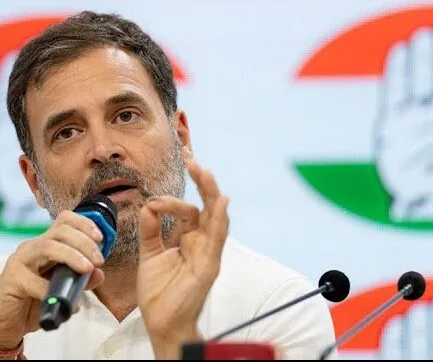The row over compensation to the family of Ajay Kumar intensifies with Rahul Gandhi reiterating that the Agniveer’s family has not received government compensation
Rahul Gandhi has once again raised questions about the compensation claims made by the family of Agniveer Ajay Kumar, who was killed in action. In a video shared on social media, the Congress leader emphasized that the family has not yet received any compensation from the government.
Gandhi highlighted the difference between ‘compensation’ and ‘insurance,’ pointing out that while the family received Rs 50 lakh from a private bank and Rs 48 lakh from the Army Group Insurance Fund, they had not received any ex-gratia payment from the government. He questioned why the salary arrears had not been credited to their account, accusing the government of failing to honour its commitments to the family of the deceased soldier.
Embed from Getty ImagesIn the video, Ajay Kumar’s father reiterated that no money had been received from the central government and demanded the promised facilities, including a pension and a canteen card. “Rajnath Singh said that families of martyrs have been given Rs 1 crore. We haven’t got that,” he stated.
Rahul Gandhi accused the Modi government of discriminating against martyrs’ families, asserting that there are two types of martyrs in India—normal jawans and Agniveers. He pointed out disparities in posthumous benefits, with Agniveers allegedly receiving fewer benefits compared to other soldiers. “Both would be martyred but one would get the status of a martyr while the other would not. One would get a pension, while the other would not. One would get canteen (facility), the other would not. If someone has laid down his or her life for the country, they should be honoured,” Gandhi said.
The Congress party has demanded that the Centre issue a “white paper” on the Agnipath scheme for short-term military recruitment to reveal the ground reality. They have also accused Defense Minister Rajnath Singh of lying in Parliament about compensation to Agniveers’ families and demanded an apology.
Ajay Kumar, a 23-year-old Agniveer, was killed on January 18 in a landmine blast near the Line of Control in Rajouri district, Jammu and Kashmir. His death has sparked a controversy over the benefits and compensations promised to Agniveers, highlighting potential inconsistencies and perceived inequities in how their sacrifices are acknowledged.
Analysis:
Political: The controversy over Agniveer Ajay Kumar’s compensation has significant political implications. Rahul Gandhi’s accusations against the Modi government put the administration under scrutiny, particularly regarding its treatment of military personnel and their families. This issue could resonate with voters who value military service and might affect public perception of the government’s commitment to national security and the welfare of soldiers. Additionally, the demand for a “white paper” on the Agnipath scheme indicates a push for transparency and accountability, potentially leading to legislative debates and policy reviews.
Social: The debate over compensation for Agniveers underscores societal concerns about fairness and recognition for those who serve the nation. It highlights the expectations of respect and support for military families, reflecting broader societal values of honour and duty. The distinctions drawn between different types of martyrs raise questions about societal norms and the criteria used to honour sacrifices. This issue may galvanize public opinion around the need for equitable treatment of all military personnel, regardless of their specific roles or designations.
Racial: While the controversy does not directly address racial issues, it indirectly touches on inclusivity and equality. The perceived discrimination between Agniveers and regular soldiers could be seen as a microcosm of broader societal inequalities. Addressing these disparities may contribute to a more inclusive and equitable approach to recognizing and compensating those who serve the nation, fostering a sense of unity and shared purpose across different communities.
Gender: Gender dynamics in the military and compensation policies are less prominent in this specific controversy. However, the broader discussion about equitable treatment and recognition of service members can extend to gender considerations. Ensuring that all military personnel, regardless of gender, receive fair compensation and support is crucial for promoting gender equality within the armed forces and acknowledging the contributions of women in defence roles.
Economic: The economic implications of the compensation controversy are significant. The differentiation between insurance payouts and government compensation highlights the financial support systems in place for military families. Ensuring that families receive the promised benefits is essential for their financial stability and well-being. The controversy may prompt a review of compensation policies and funding allocations, potentially leading to reforms that enhance the economic security of military families. Additionally, transparent and fair compensation practices can boost morale among service members, contributing to a more committed and effective military force.
